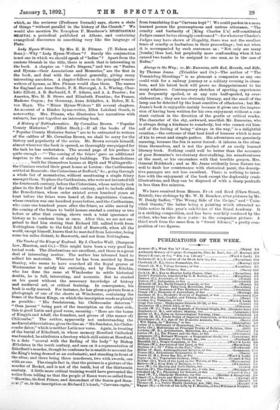The Tombs of the Kings of England. By J. Charles
Wall. (Sampson Low, Marston, and Co.)—This might have been a very good his- torical work. The illustrations are excellent, and there is a great deal of interesting matter. The author has laboured hard to collect his materials. Wherever he has been assisted by Dean Stanley, who seems to have searched all the Royal graves at Westminster to satisfy his curiosity, and by Dean Kitchin, who has done the same at Winchester to settle historical doubts, be is full, interesting, and accurate. But he started on his quest without the necessary knowledge of history and mediaeval art, or critical training. In consequence, his book is sadly marred. For instance, he has given a picture from a photograph of one of the chests at Winchester, containing the bones of the Saxon Kings, on which the inscription reads as plainly as possible : " Hie fundatorum, hie Chiltecombe datorum." "Ossa jacent " being part of the inscription on the other side, this is good Latin and good verse, meaning : " Here are the bones of Kingyls and Adult the founders, and givers of (the manor of) Chilcombe." The author, apparently not understanding the mediaeval abbreviations, gives the line as : "Hic fundator, hic Chilte- combe dater," which is neither Latin nor verse. Again, in treating of the burial of Ethelbert, in whose memory Hereford Cathedral was founded, he attributes a feretory which still exists at Hereford, to a date "co-eval with the finding of the body" by Bishop £thelstan in the tenth century, and sees on it a representation of Ethelbert's murder, though he confesses he is unable to account for the King's being dressed as an ecclesiastic, and standing in front of the altar, and there being three murderers, two with swords, one with an axe. The simple fact is, that the picture is a picture of the murder of Becket, and is not .of the tenth, but of the thirteenth century. A little more critical training would have prevented the writer from telling us that the people of Essex were so called from " CEsewine, its first Prince, and descendant of the Saxon god Seax- . nc at ;" or, in the inscription on Richard I.'s tomb, " Carvana capta," from translating it as "Carvana kept" ! We could pardon in a more learned person the presumptuous and untrue utterance, " The cruelty and barbarity of [King Charles I.'s] self-constituted Judges cannot be too strongly condemned"—for whatever Charles's Judges may have shown of illegality, there was not the smallest trace of cruelty or barbarism in their proceedings ; but not when it is accompanied by such sentences as : "Not only are many [tombs] thus lost, but perplexity more confounding when it has caused two tombs to be assigned to one man, as in the case of Rufus."














































 Previous page
Previous page